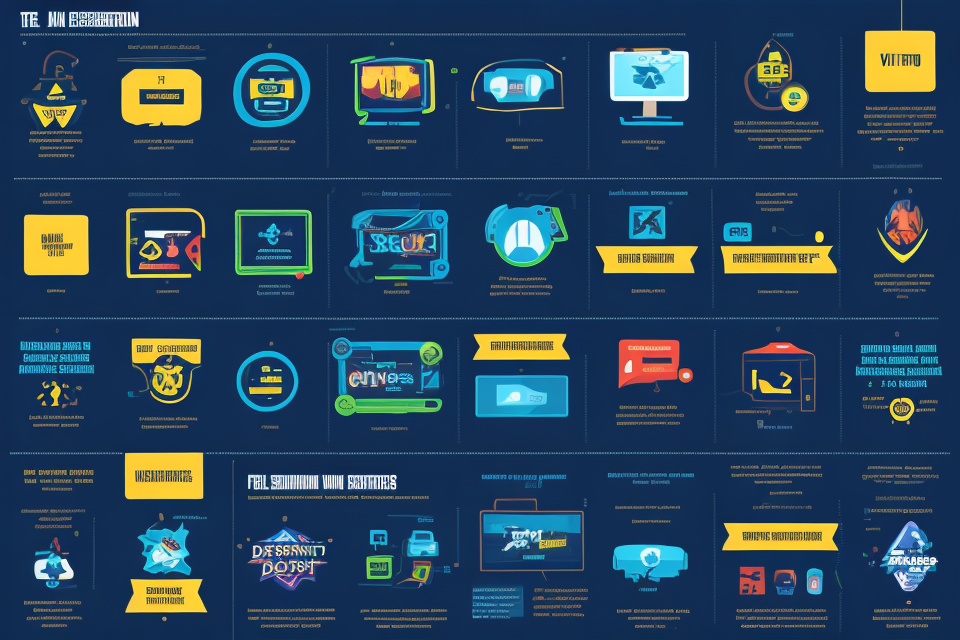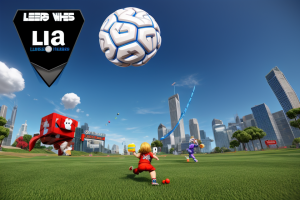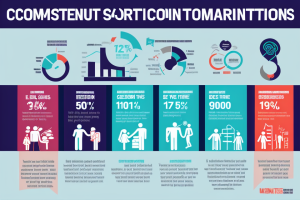
Are you ready to level up your cognitive abilities? The debate on whether video games improve quick thinking skills has been a hot topic for years. On one hand, proponents argue that the fast-paced, dynamic nature of video games requires players to make split-second decisions, enhancing their ability to think quickly and respond to challenges. On the other hand, skeptics argue that video games are simply a form of entertainment with no real cognitive benefits. But what does the scientific research say? In this comprehensive examination, we’ll explore the latest studies and findings on the topic, and uncover the truth about whether video games can actually enhance our quick thinking skills. So, gamer or not, buckle up and get ready to discover the surprising effects of video games on the human brain.
The Relationship Between Video Games and Quick Thinking
Theories on Cognitive Development
Cognitive Load Theory
Cognitive Load Theory (CLT) is a theoretical framework that aims to explain how the amount of information presented to an individual and the demands of a task can impact cognitive performance. According to CLT, when individuals are presented with too much information or too many demands, their cognitive resources become overloaded, leading to a decline in performance.
Transfer of Learning
The transfer of learning refers to the ability of an individual to apply knowledge or skills acquired in one context to another context. In the context of video games and cognitive development, the transfer of learning suggests that the skills and knowledge acquired through playing video games can be applied to other tasks and activities.
Other Theories
There are several other theories that have been proposed to explain the relationship between video games and cognitive development. These include:
- The immersion hypothesis, which suggests that video games can lead to an increase in immersion and engagement, leading to an improvement in cognitive performance.
- The expertise reversal effect, which suggests that individuals who are experts in a particular domain may perform worse on tasks that are outside of their area of expertise.
- The flow theory, which suggests that video games can lead to a state of flow, where individuals are fully immersed in the task and experience a sense of enjoyment and mastery.
Overall, the relationship between video games and cognitive development is a complex and multifaceted one, and a comprehensive examination of this relationship requires a consideration of multiple theories and perspectives.
Key Research Studies
Study 1: Immediate Impact on Reaction Time
In this study, researchers aimed to investigate the immediate impact of video games on reaction time. The participants were divided into two groups: a control group and an experimental group. The control group did not play any video games, while the experimental group played a fast-paced video game for 30 minutes.
Results showed that the reaction time of the experimental group was significantly faster than that of the control group. This suggests that playing video games may have an immediate impact on reaction time.
Study 2: Long-Term Benefits on Decision-Making
This study examined the long-term benefits of playing video games on decision-making skills. The participants were also divided into two groups: a control group and an experimental group. The control group did not play any video games, while the experimental group played a strategy-based video game for 30 minutes per day over a period of two weeks.
Results showed that the experimental group performed better in decision-making tasks compared to the control group. Furthermore, the experimental group’s performance improved over time, indicating that there may be long-term benefits of playing video games on decision-making skills.
Overall, these studies suggest that playing video games may have both immediate and long-term benefits on quick thinking skills, including reaction time and decision-making. However, more research is needed to fully understand the relationship between video games and quick thinking skills.
Video Games and Brain Plasticity
Neuroplasticity
Neuroplasticity is the brain’s ability to change and adapt in response to new experiences, such as learning a new skill or forming new memories. This phenomenon is critical for cognitive development and is crucial for understanding how video games may affect the brain.
Structural Changes
Structural changes refer to the physical changes that occur in the brain as a result of neuroplasticity. These changes can be observed at various levels, from the growth of new neurons to the strengthening of existing connections between neurons. For example, when individuals learn a new skill, such as playing a video game, the brain forms new neural connections, and existing connections become strengthened. These changes can be observed in various regions of the brain, including the prefrontal cortex, which is responsible for decision-making and planning, and the parietal cortex, which is responsible for processing sensory information.
Functional Changes
Functional changes refer to the changes in the way the brain functions as a result of neuroplasticity. These changes can be observed through various methods, such as functional magnetic resonance imaging (fMRI) or electroencephalography (EEG). For example, when individuals play video games, the brain regions involved in visual processing, motor control, and attention become more active. Additionally, individuals who play video games frequently have been found to have increased activity in the prefrontal cortex, which is associated with higher cognitive control and executive function.
Overall, the phenomenon of neuroplasticity suggests that video games may have a significant impact on the brain’s structure and function. The following sections will delve deeper into the relationship between video games and cognitive enhancement, focusing on the potential benefits and drawbacks of video game play.
The Role of Video Games in Neuroplasticity
Video games have been shown to have a significant impact on brain plasticity, which refers to the brain’s ability to change and adapt in response to new experiences. Research has demonstrated that playing video games can lead to changes in various cognitive processes, including attention and memory formation.
Enhancing Attention and Perception
One of the most widely studied effects of video games on the brain is their ability to enhance attention and perception. Studies have found that action video games, in particular, can improve visual attention and perceptual processing. This is likely due to the fast-paced and visually complex nature of these games, which require players to rapidly process and respond to multiple stimuli.
Boosting Memory Formation
In addition to enhancing attention and perception, video games have also been shown to boost memory formation. Research has found that playing certain types of video games, such as puzzle and strategy games, can improve working memory and long-term memory. This is likely due to the cognitive demands of these games, which require players to use a range of cognitive skills, including spatial reasoning and problem-solving.
Overall, the evidence suggests that video games can have a positive impact on brain plasticity and cognitive function. However, it is important to note that not all video games have the same effects, and the extent to which video games can enhance cognitive skills may depend on factors such as the type of game, the amount of time spent playing, and individual differences in cognitive abilities.
Factors Influencing the Effectiveness of Video Games
Type of Video Game
Video games are designed with various genres and gameplay mechanics that can significantly impact the extent to which they enhance quick thinking skills. This section will examine the relationship between different types of video games and their influence on cognitive abilities.
Action vs. Strategy Games
Action games are characterized by fast-paced gameplay that requires players to react quickly to changing situations. These games often involve direct control over a character’s movements and actions, with a focus on combat and physical challenges. In contrast, strategy games involve making decisions and managing resources to achieve objectives. Players must anticipate future events and plan their actions accordingly.
Action Games
- May improve reaction time and spatial awareness
- May enhance hand-eye coordination
- May contribute to the development of impulsive decision-making
Strategy Games
- May improve planning and problem-solving skills
- May enhance critical thinking and foresight
- May increase familiarity with complex systems and situations
Single-Player vs. Multiplayer Games
Single-player games are typically designed for one person to play through the game’s story and objectives. Multiplayer games, on the other hand, involve multiple players competing or cooperating to achieve a common goal.
Single-Player Games
- May enhance self-motivation and determination
- May increase the capacity for focused attention
- May contribute to the development of self-reliance and independence
Multiplayer Games
- May improve social interaction and communication skills
- May foster collaboration and teamwork
- May enhance the ability to understand and predict the actions of others
In conclusion, the type of video game played can significantly impact the development of quick thinking skills. Action games may improve reaction time and hand-eye coordination, while strategy games may enhance planning and problem-solving abilities. Single-player games may increase self-motivation and focus, while multiplayer games may improve social interaction and collaboration. Understanding the unique characteristics of different video game genres can help guide players and researchers in identifying the most effective games for enhancing cognitive abilities.
Player Characteristics
- Age
- Gender
- Existing Skills
Age
Age is a crucial factor that can influence the effectiveness of video games in enhancing quick thinking skills. Studies have shown that younger players tend to adapt more quickly to new games and learn game mechanics faster than older players. This may be due to the fact that younger players have more cognitive flexibility and are more adept at processing new information. However, it is important to note that age is not the only factor that affects the ability to learn from video games. Other factors such as motivation, interest, and prior experience can also play a significant role.
Gender
Gender is another player characteristic that can impact the effectiveness of video games in enhancing quick thinking skills. While research on this topic is limited, some studies suggest that there may be gender differences in how players approach and engage with video games. For example, female players may be more likely to engage in social and cooperative gameplay, while male players may be more competitive and focused on achieving high scores. These differences in gameplay styles may affect the extent to which video games are effective in enhancing quick thinking skills.
Existing Skills
A player’s existing skills can also influence the effectiveness of video games in enhancing quick thinking skills. Players who have prior experience with similar games or who have a background in gaming may find it easier to learn new games and develop quick thinking skills. Conversely, players who are new to gaming or who have limited experience with video games may require more time and practice to develop these skills. The level of challenge provided by the game can also impact the effectiveness of video games in enhancing quick thinking skills. Games that are too easy may not provide enough of a challenge to encourage players to develop these skills, while games that are too difficult may be frustrating and discouraging for players.
Overall, player characteristics such as age, gender, and existing skills can impact the effectiveness of video games in enhancing quick thinking skills. Understanding these factors can help game developers create games that are more tailored to the needs and abilities of different players, ultimately leading to more effective learning outcomes.
Contextual Factors
- Length of Gameplay
- Duration of gameplay has a significant impact on the development of quick thinking skills.
- Longer gameplay sessions can lead to more opportunities for skill development.
- However, excessive play can also lead to burnout and decreased effectiveness.
- Frequency of Play
- Regular gameplay can help reinforce skills and lead to better retention.
- Consistent practice can increase muscle memory and reaction time.
- Frequent play can also help build problem-solving skills.
- Motivation for Playing
- The reason behind playing video games can affect the development of quick thinking skills.
- If the player is motivated by a desire to improve their skills, they are more likely to engage in challenging gameplay and persist through difficulties.
- However, if the player is only motivated by the desire to win or achieve rewards, they may neglect the development of their skills.
It is important to consider these contextual factors when examining the effectiveness of video games in enhancing quick thinking skills.
Alternative Ways to Improve Quick Thinking
Traditional Methods
Cognitive Training Programs
Cognitive training programs are designed to enhance cognitive abilities such as memory, attention, and processing speed. These programs often involve tasks that challenge the brain and promote neuroplasticity, which is the brain’s ability to form new neural connections and adapt to new experiences. Some examples of cognitive training programs include brain games, memory training exercises, and working memory tasks.
One example of a cognitive training program is the CogniFit Brain Fitness Program, which offers a variety of personalized brain training exercises that are tailored to each individual’s cognitive abilities and needs. The program includes games and activities that challenge the brain in different ways, such as memory, attention, and processing speed. By practicing these exercises regularly, individuals can improve their cognitive abilities and enhance their quick thinking skills.
Physical Exercise
Physical exercise has been shown to have a positive impact on cognitive function, including quick thinking skills. Exercise can improve blood flow and oxygenation to the brain, which can enhance brain function and promote neuroplasticity. Additionally, exercise has been shown to improve executive function, which includes skills such as working memory, attention, and cognitive control.
Research has shown that regular exercise can improve cognitive function in both children and adults. For example, a study published in the Journal of Pediatrics found that children who engaged in regular physical activity had better working memory and processing speed compared to those who were less active. Similarly, a study published in the Journal of Gerontology found that older adults who engaged in regular physical activity had better cognitive function and a lower risk of cognitive decline.
In conclusion, traditional methods such as cognitive training programs and physical exercise can be effective in enhancing quick thinking skills. These methods provide alternative ways to improve cognitive function and enhance brain function, without relying on video games or other electronic media.
Alternative Media
There are several alternative media that can be used to improve quick thinking skills, such as puzzle games and interactive simulations.
Puzzle Games
Puzzle games are a popular form of entertainment that require players to think quickly and strategically to solve challenges. These games can be found on various platforms, including computers, mobile devices, and gaming consoles. Some popular examples of puzzle games include Tetris, Sudoku, and Candy Crush.
Playing puzzle games can help improve quick thinking skills by requiring players to make split-second decisions and find creative solutions to problems. Additionally, puzzle games can improve spatial reasoning and problem-solving abilities, which can be useful in a variety of real-life situations.
Interactive Simulations
Interactive simulations are digital environments that allow users to explore and interact with virtual worlds. These simulations can be used for a variety of purposes, including education, training, and entertainment. Some examples of interactive simulations include flight simulators, medical simulations, and virtual reality experiences.
Playing interactive simulations can help improve quick thinking skills by providing players with real-time feedback and challenging them to make decisions in high-pressure situations. Additionally, interactive simulations can help players develop a better understanding of complex systems and improve their ability to think on their feet.
Overall, while video games are a popular way to improve quick thinking skills, there are many other alternative media that can be just as effective. Puzzle games and interactive simulations are two examples of such media that can help players develop their quick thinking abilities and improve their problem-solving skills.
The Role of Video Games in Enhancing Quick Thinking Skills
Video games have long been considered a source of entertainment, but recent studies suggest that they may also play a role in enhancing quick thinking skills. The fast-paced and dynamic nature of many video games requires players to make quick decisions and react rapidly to changing situations. This can lead to improvements in several areas, including:
- Attention and Focus: Many video games require players to pay close attention to their surroundings and react quickly to changes in the environment. This can help improve focus and attention, which are essential for quick thinking.
- Perception and Processing: Video games often involve rapidly changing visual and auditory stimuli, which can help improve perception and processing speed. This can lead to faster reaction times and improved ability to make decisions based on limited information.
- Memory and Learning: Video games often require players to learn new skills and strategies, which can lead to improvements in memory and learning. This can help players retain information and make quick decisions based on past experiences.
- Problem Solving and Reasoning: Many video games require players to solve puzzles and overcome obstacles, which can help improve problem-solving and reasoning skills. This can lead to improved ability to think critically and make quick decisions based on logical reasoning.
While the potential benefits of video games for quick thinking are promising, it is important to note that not all video games are created equal. Some games may be more effective at enhancing quick thinking skills than others, depending on factors such as game design, difficulty level, and player engagement. Additionally, excessive or unsupervised gaming can have negative effects on cognitive development, so it is important to balance gaming with other activities and maintain a healthy gaming habit.
Overall, the role of video games in enhancing quick thinking skills is an area that warrants further research and exploration. As technology continues to advance and video games become more sophisticated, it is possible that they may play an even greater role in promoting cognitive development and improving quick thinking skills.
The Importance of Balance and Moderation
While video games have been found to enhance certain cognitive skills, it is essential to consider alternative methods of improving quick thinking abilities. Balance and moderation play a crucial role in maintaining a well-rounded approach to cognitive development.
Balancing Active and Passive Activities
Engaging in a variety of activities is vital for overall cognitive development. A balanced lifestyle includes both active and passive pursuits, such as physical exercise, social interactions, and intellectual pursuits. Video games, when played in moderation, can be considered a form of leisure activity that contributes to this balance.
Moderating Screen Time
Excessive screen time, whether it’s from video games or other digital media, has been linked to negative effects on cognitive development. It is essential to set limits on screen time and encourage participants to engage in alternative activities that promote quick thinking skills.
Diversifying Cognitive Stimulation
Exposure to a wide range of stimuli is crucial for cognitive development. While video games can provide cognitive benefits, it is important to diversify sources of cognitive stimulation. Engaging in activities such as reading, puzzles, and strategic games can offer unique challenges that contribute to quick thinking skills.
Promoting Healthy Habits
A healthy lifestyle, including regular exercise, balanced diet, and adequate sleep, plays a significant role in cognitive development. Encouraging participants to adopt these habits can have a positive impact on their quick thinking abilities.
Incorporating Educational Opportunities
Integrating educational experiences into daily life can also contribute to cognitive development. Participating in workshops, attending lectures, or engaging in self-directed learning can provide valuable opportunities for enhancing quick thinking skills.
By emphasizing the importance of balance and moderation, participants can make informed decisions about their daily activities, ensuring a well-rounded approach to cognitive development.
Future Directions for Research
- Investigating the effects of different types of video games on cognitive skills: There is a need for more research to explore the specific effects of different genres of video games on cognitive skills such as attention, memory, and decision-making.
- Examining the long-term effects of video game play: While some studies have suggested that video game play can improve cognitive skills, more research is needed to determine the long-term effects of video game play on cognitive development.
- Investigating the impact of video game play on cognitive skills in different populations: More research is needed to understand the impact of video game play on cognitive skills in different populations, such as children, adolescents, and adults, as well as in individuals with different levels of cognitive ability.
- Exploring the potential negative effects of video game play: While some studies have suggested that video game play can improve cognitive skills, it is also important to investigate the potential negative effects of video game play, such as addiction, violence, and decreased social interaction.
- Investigating the effects of video game play in combination with other activities: There is a need for more research to explore the effects of video game play in combination with other activities, such as physical exercise, social interaction, and educational interventions, on cognitive skills.
- Examining the impact of video game play on cognitive skills in real-world settings: While most research on the effects of video game play on cognitive skills has been conducted in laboratory settings, more research is needed to understand the impact of video game play on cognitive skills in real-world settings, such as in the workplace or in everyday life.
Final Thoughts
While video games have been found to have a positive impact on quick thinking skills, it is important to note that they are not the only means of improving these abilities. In fact, there are a variety of alternative methods that can be just as effective, if not more so, in enhancing quick thinking skills.
One such method is through the practice of mindfulness meditation. This technique involves focusing one’s attention on the present moment, while acknowledging and accepting one’s thoughts and feelings without judgment. By regularly engaging in mindfulness meditation, individuals can improve their ability to focus and pay attention, as well as increase their cognitive flexibility and mental agility.
Another alternative method is through the practice of puzzle-solving activities, such as crosswords, Sudoku, and logic games. These types of activities require individuals to think critically and creatively, and can help improve their problem-solving skills and cognitive abilities.
In addition, physical exercise has been shown to have a positive impact on cognitive function, including quick thinking skills. Regular physical activity can improve brain function, including memory, attention, and processing speed, as well as reduce the risk of cognitive decline.
Overall, while video games can be a fun and effective way to improve quick thinking skills, it is important to consider alternative methods as well. By incorporating a variety of activities into one’s routine, individuals can improve their cognitive abilities and enhance their overall brain function.
FAQs
1. Do video games really improve quick thinking?
There is a common perception that video games can improve quick thinking. This notion is based on the fact that many video games require players to make quick decisions and react quickly to changing situations. Some studies have shown that playing video games can improve certain cognitive skills, such as spatial awareness and hand-eye coordination. However, it is important to note that not all video games are created equal, and some may have negative effects on cognitive development.
2. How do video games improve quick thinking?
Video games can improve quick thinking by requiring players to make split-second decisions and react to changing situations. Many video games also involve problem-solving, which can help players develop their critical thinking skills. Some games also require players to multitask, which can improve their ability to focus and pay attention to multiple things at once. Additionally, video games often provide immediate feedback, which can help players learn from their mistakes and improve their decision-making skills.
3. What kind of video games are best for improving quick thinking?
Any video game that requires players to make quick decisions and react to changing situations can potentially improve quick thinking. However, some genres of games may be more effective than others. For example, action games, racing games, and strategy games are all examples of genres that can potentially improve quick thinking. However, it is important to note that the quality of the game itself is also important. A well-designed game with challenging gameplay and a good learning curve is more likely to improve quick thinking than a poorly designed game.
4. Is there a downside to playing video games for improving quick thinking?
While playing video games can potentially improve quick thinking, there are also potential downsides to consider. Excessive playing of video games has been linked to a number of negative effects, such as increased aggression, decreased social skills, and decreased academic performance. It is important to play video games in moderation and to balance gaming time with other activities, such as exercise and socializing.
5. Are there any alternatives to playing video games for improving quick thinking?
Yes, there are many alternatives to playing video games for improving quick thinking. For example, engaging in physical activities, such as sports or martial arts, can improve hand-eye coordination and reaction time. Puzzle games, such as Sudoku or crosswords, can also improve cognitive skills, such as problem-solving and critical thinking. Additionally, practicing mindfulness and meditation can help improve focus and attention.





